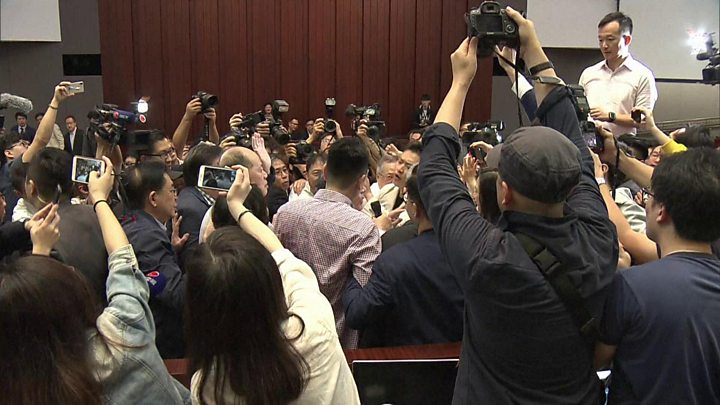
Media playback is unsupported on your device
Fighting erupted in Hong Kong's legislature on Saturday over planned changes to the law allowing suspects to be sent to mainland China for trial.
Several lawmakers were injured and one was taken to hospital as politicians clashed in the chamber.
Critics believe the proposed switch to the extradition law would erode Hong Kong's freedoms.
But authorities say they need to make the change so they can extradite a murder suspect to Taiwan.
One pro-Beijing lawmaker called it "a sad day for Hong Kong".
Pro-democracy lawmaker James To originally led the session on the controversial extradition bill but earlier this week those supportive of the new law replaced him as chairman.
Tensions boiled over on Saturday, with politicians swearing and jumping over tables amid a crowd of reporters as they fought to control the microphone.
Pro-democracy legislator Gary Fan collapsed and was carried out on a stretcher, while one pro-Beijing legislator was later seen with his arm in a sling.
Why change the extradition laws?
Under a policy known as "One Country, Two Systems", Hong Kong has a separate legal system to mainland China.
Beijing regained control over the former British colony in 1997 on the condition it would allow the territory "a high degree of autonomy, except in foreign and defence affairs" for 50 years.
But Hong Kong's pro-Beijing leader Carrie Lam earlier this year announced plans to change the law so suspects could be extradited to Taiwan, Macau or mainland China on a case-by-case basis.
Ms Lam has cited the case of a 19-year-old Hong Kong man who allegedly murdered his pregnant girlfriend while on holiday in Taiwan before fleeing home.
While Taiwan has sought his extradition, Hong Kong officials say they cannot help as they do not have an extradition agreement with Taiwan.
Why object to the switch?
The proposed change has generated huge criticism.
Protesters against the law marched on the streets last month in the biggest rally since 2014's pro-democracy Umbrella Movement demonstrations.
Even the normally conservative business community has objected. The International Chamber of Commerce in Hong Kong said the bill has "gross inadequacies" which could mean people risk "losing freedom, property and even their life".
And Chris Patten, the last British governor of Hong Kong, told the government-funded broadcaster RTHK last month the proposal was "an assault on Hong Kong's values, stability and security".
https://www.bbc.com/news/world-asia-48237316
2019-05-11 08:16:01Z
CBMiLGh0dHBzOi8vd3d3LmJiYy5jb20vbmV3cy93b3JsZC1hc2lhLTQ4MjM3MzE20gEwaHR0cHM6Ly93d3cuYmJjLmNvbS9uZXdzL2FtcC93b3JsZC1hc2lhLTQ4MjM3MzE2
Tidak ada komentar:
Posting Komentar